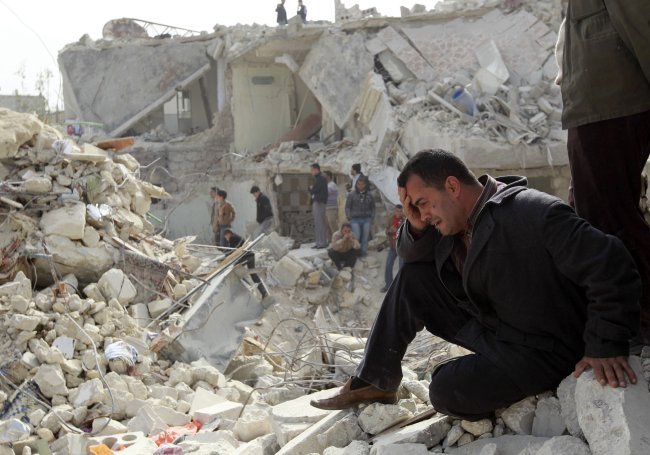Syria may have used chemical weapons against rebels, the White House has said.
US intelligence agencies believe “with varying degrees of confidence” that the nerve agent sarin had been deployed on a “small scale”, and did not say where or when it had been used.
The White House has warned chemical weapons use would be a “red line” for possible intervention, but says this intelligence does not represent proof.
Republicans in Congress called on Thursday for a strong US response.
The assessment was made in letters to lawmakers on Thursday signed by Miguel Rodriguez, White House director of the office of legislative affairs.
“Our intelligence community does assess, with varying degrees of confidence, that the Syrian regime has used chemical weapons on a small scale in Syria, specifically, the chemical agent sarin,” one of the letters said.
But it added: “Given the stakes involved, and what we have learned from our own recent experiences, intelligence assessments alone are not sufficient – only credible and corroborated facts that provide us with some degree of certainty will guide our decision-making.”
The phrase “varying degrees of confidence” is normally used to reflect differences in opinion within the intelligence community.

Speaking to reporters in Abu Dhabi on Thursday, US Defence Secretary Chuck Hagel told reporters in Abu Dhabi that the use of sarin “violates every convention of warfare”.
Secretary of State John Kerry said there had been two instances of chemical weapons use in Syria.
The UK Foreign Office echoed the US claims, saying it had “limited but persuasive information from various sources” of chemical weapons use in Syria.
It is understood that Britain obtained samples from inside Syria that have been tested by the Defence Science and Technology Laboratory at Porton Down, Wiltshire.
“Material from inside Syria tested positive for sarin,” a Foreign Office spokesman said.
Syria is believed to possess large quantities of chemical weapons and there has been heightened concern among the international community in recent months about the safety of the stockpiles.
Although there have been numerous accusations, there has so far not been any confirmation that chemical weapons have been used during Syria’s two-year-old conflict.
President Barack Obama warned in December that Syrian President Bashar al-Assad would face “consequences” if he used such weapons.
The letters released on Thursday were sent to powerful US senators John McCain and Carl Levin.
In response, Senator John McCain told reporters: “It’s pretty obvious that red line has been crossed.”
John McCain recommended arming the opposition, a step the White House has been reluctant to take. He also urged taking steps to ensure that Syria’s chemical weapons did not fall into the wrong hands.
“It does not mean boots on the ground,” the Arizona senator added.
Democrat Dianne Feinstein, chair of the Senate Intelligence Committee, called for international action to help secure Syria’s stockpile of chemical arms.
Robert Menendez, the Democratic Chairman of the Senate Foreign Relations Committee, said options included “an internationally recognized no-fly zone, providing lethal assistance to vetted opposition forces, and sanctioning the transfer of arms to the regime”.
White House officials said the US would consult with allies and seek more evidence to confirm their intelligence.
On Tuesday, a senior Israeli military official accused Syrian forces of having used the nerve agent sarin against rebels several times. People can normally recover from small doses.
Speaking at a security conference in Jerusalem, Brigadier General Itai Brun cited photographs of victims foaming at the mouth and with constricted pupils and other unspecified symptoms.
Syria’s government and rebels have accused each other of using chemical weapons. A UN team is trying to enter Syria to investigate.
Sarin is a colorless and highly toxic nerve agent that can cause convulsions, paralysis and death within minutes if it is absorbed through inhalation, ingestion, or contact with skin or eyes.
According to the UN, at least 70,000 people have been killed in the Syrian conflict.
[youtube t6wXfhtMnms]
